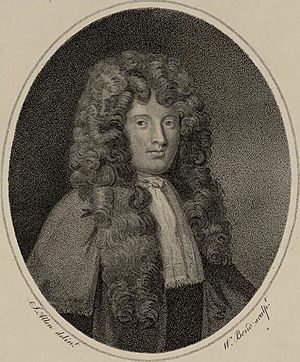Sir William Williams, 1st Baronet, of Gray's Inn facts for kids
Quick facts for kids
Sir William Williams
|
|
|---|---|
 |
|
| Speaker of the House of Commons | |
| In office 1680–1685 |
|
| Monarch | Charles II |
| Preceded by | Sir William Gregory |
| Succeeded by | Sir John Trevor |
| Solicitor General for England and Wales | |
| In office 1687–1689 |
|
| Monarch | James II & VII |
| Preceded by | Sir Thomas Powys |
| Succeeded by | Sir George Treby |
| Personal details | |
| Born | 1634 Anglesey, Wales |
| Died | 11 July 1700 London, England |
| Resting place | Llansilin, Wales |
| Alma mater | Jesus College, Oxford |
| Profession | Lawyer, politician |
Sir William Williams, 1st Baronet (born 1634 – died 11 July 1700) was an important Welsh lawyer and politician. He was a Member of Parliament, representing Chester and later Beaumaris. Sir William also served as Speaker for two English Parliaments during the time of King Charles II. Later, he became the Solicitor General under King James II. He was known for his strong disagreements with Judge Jeffreys.
Contents
Early Life and Education
William Williams was born in Anglesey, Wales, in 1634. He was the oldest son of Hugh Williams and Emma Dolben. He went to Jesus College, Oxford for his education. After that, he studied law at Gray's Inn, a famous law school in London, starting in 1650.
Becoming a Member of Parliament
Sir William first tried to become a Member of Parliament for Chester in 1673 but was not successful. However, he was elected for Chester in 1675. As he became more well-known, he was chosen to be the Speaker of the House of Commons. This was a very important job.
He held the Speaker role during two parliaments under King Charles II. These were the parliaments of 1680–1681 and 1681. Sir William Williams was the first person from Wales to become Speaker.
Challenges as Speaker
In 1684, Sir William faced problems because of something he approved as Speaker. He had allowed the publication of a document by Thomas Dangerfield in 1680. This document made claims against the Duke of York, who later became King James II.
Even though Dangerfield's claims were later found to be untrue, Sir William was still in trouble. To protect himself, he ran for Parliament again in Montgomeryshire in 1685 and won. However, his election was cancelled. The problems continued, and he was ordered to pay a large amount of money.
Many people helped him, including the Earl of Rochester. Eventually, he paid a smaller amount to settle the issue.
Serving the King
Even though he had been a critic of King James II before, Sir William joined the King's service in 1687. He was made Solicitor General, a high legal position. Just two days before this, he had been made a Knight Bachelor. In June 1688, he was given the special title of baronet.
He played a part in the legal case against the Seven Bishops. During this time, he had a strong disagreement with the judge, Sir Robert Wright. This disagreement might have helped the bishops be found not guilty. Sir William also had a long-standing rivalry with Judge Jeffreys.
After the Glorious Revolution
Sir William represented Beaumaris in the 1689 Convention Parliament. When King James II left England during the Glorious Revolution, Sir William supported the new rulers. He helped create the Bill of Rights, an important document that set out people's rights.
King William III appointed Sir George Treby to take over as Solicitor General. Sir William was given other important roles as a King's Counsel and a local official in Merionethshire and Denbighshire. The Parliament also declared that the earlier judgment against him for publishing Dangerfield's document was wrong.
He did not get elected to Parliament in 1690. He tried again for Chester in 1695 but was not successful. He was elected for Beaumaris again. However, he refused to take a new oath that declared William the rightful king. This led to him losing his position as King's Counsel. He left Parliament in 1698.
Family Life
Sir William Williams married Margaret Kyffin on April 14, 1664. They had four sons and one daughter together.
Sir William passed away in his London home in 1700. He was buried in Llansilin, Wales. His son, also named William, inherited his baronetcy title.
 | Kyle Baker |
 | Joseph Yoakum |
 | Laura Wheeler Waring |
 | Henry Ossawa Tanner |

